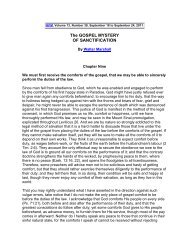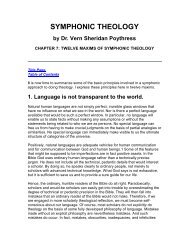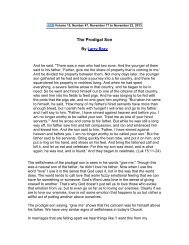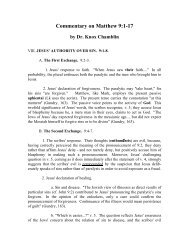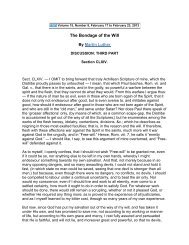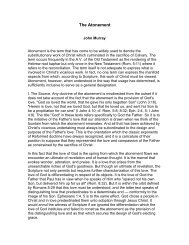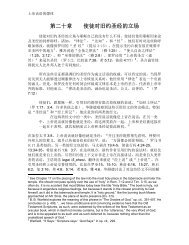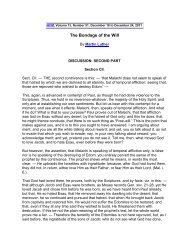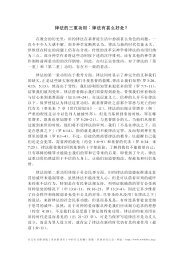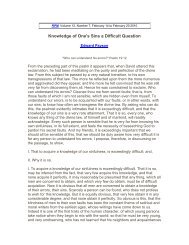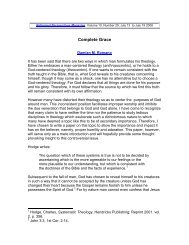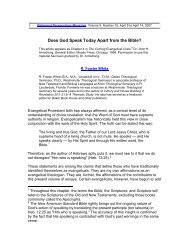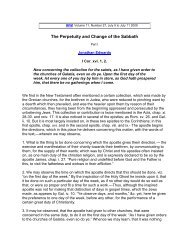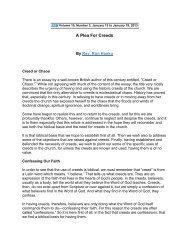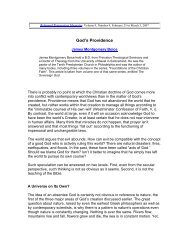COMPETITION AND CREATION by Frank Reich
COMPETITION AND CREATION by Frank Reich
COMPETITION AND CREATION by Frank Reich
Create successful ePaper yourself
Turn your PDF publications into a flip-book with our unique Google optimized e-Paper software.
IIIM Magazine Online, Volume 4, Number 6, February 11 to February 17, 2002<br />
<strong>COMPETITION</strong> <strong>AND</strong> <strong>CREATION</strong><br />
<strong>by</strong> <strong>Frank</strong> <strong>Reich</strong><br />
F<br />
rom the cradle to the grave it seems as if we compete in just about<br />
everything we do. The problem is that Christians have a difficult time<br />
understanding how to deal with the “competitive spirit” that lies within<br />
us. At one extreme, some choose to ignore it, thinking that competition is evil,<br />
therefore trying to avoid it at all cost. At the other extreme are those who worship<br />
it <strong>by</strong> finding their identity <strong>by</strong> the results of competition. Is the reality of our<br />
unremitting competitive mindset simply one more outworking of our sinful flesh<br />
fighting to see ourselves superior over others? Or could it be that in God’s<br />
Dominion Mandate to “be fruitful and multiply, rule over and subdue the earth”<br />
(Gen 1:28) is the seed that breeds the competitiveness in each one of us?<br />
Clearly the “ruling and subduing” portion of this command seem to imply some<br />
kind conquering, and if this is true it seems as if competition is inevitable. The old<br />
preachers use to say that sin is not in a bottle; it is in our hearts. In the same way<br />
I would say that competition is not inherently sinful, but due to our fallen nature<br />
we repeatedly use it for selfish gain. We will briefly examine the Dominion<br />
Mandate within a Kingdom of God framework, and in the end I will suggest that<br />
we are, in a sense, created to compete!<br />
THE DOMINION M<strong>AND</strong>ATE<br />
Christian men and women of all vocations are constantly warned about<br />
the dangers of allowing our jobs to be the source of our identity and self-worth.<br />
We are rightly taught that it is only through the blood of Christ that we have been<br />
redeemed from the bondage of sin and been brought into the kingdom of God (1<br />
Cor 6:20; Gal 3:13 Col 1:13,14) – this is to be the foundation of our identity and<br />
self-worth! Nonetheless, having a clear vision of what we have been called to do<br />
is important. Certainly the diversity of the body of Christ is great in respects to<br />
many different vocations we are called to <strong>by</strong> God. But one assignment that is<br />
common to all Christians is that we practice multiplication and dominion (Gen<br />
1:28).<br />
It is helpful and necessary to see this command in context of God’s<br />
creation that reaches its climax on the sixth day. Doug Kelly draws the<br />
comparison to the methodical construction of a great mansion where “the work of<br />
the first five days of creation was preparatory for the crowning action of the sixth<br />
day: the creation of mankind.” 1 Kelly notes a significant shift in the language at<br />
Genesis 1:26 that denotes what follows as the high point of creation. The<br />
language now becomes personal giving strong indication that God is in<br />
1 Douglas F. Kelly, Creation and Change (Ross-shire, Great Britain: Mentor) 215.<br />
1
“consultation within Himself.” 2 The final result of this ‘executive divine counsel’<br />
(as called <strong>by</strong> some theologians) is the creation of the human race. The<br />
distinguishing mark being that mankind is made in the image of his Maker, and<br />
as such, Kelly says, there is a divine pattern in mankind that is not found in other<br />
creatures in which we are “like Him in certain definite respects.” 3<br />
This fact does not diminish the significance that we are still only finite<br />
images of an infinite God. Our purpose here is not to give detailed explanation of<br />
the difference between being an image and a duplicate ? for that I would<br />
commend Von Rad’s comments on the subject. 4 Instead, our focus is on the fact<br />
that to those image bearers who are Spirit-filled ? God has provided with the<br />
credentials for the task He assigned us ? namely, that of the dominion (cultural)<br />
mandate to “be fruitful and multiply, rule over and subdue the earth” (Gen 1:28).<br />
Kelly writes, “Only because mankind was created in the image of God was it<br />
appropriate to grant him the awesome responsibility of dominion over the entire<br />
created order.” 5<br />
As Christians we must be careful not to take for granted, abuse, or take<br />
pride in the position and job we have been given. We are reminded that we have<br />
simply been placed here as “God’s sovereign emblem,” and “summoned to<br />
maintain and enforce God’s claim to dominion over the earth.” 6 Our task is the<br />
most humble of tasks since it is not done out of self-interest or from our own<br />
strength. Richard Pratt writes that “God did not call us to have dominion over the<br />
earth for our own glory and honor… We work hard at our tasks so that God might<br />
be honored… Ruling over the earth as God’s likeness is a service that often<br />
entails forfeiting personal pleasure and gratifications for the glory of God.” 7 It<br />
follows that everything we do ? including our vocation but not limited to it ? is<br />
directed to giving glory to God.<br />
The cultural mandate calls for multiplication and dominion, but what<br />
exactly does this mean? Many Christians have a limited view that sees bearing<br />
children and “farming the land” as the primary extent of this command, but there<br />
is much more to consider. We have seen comic strips where good and an angel<br />
on one shoulder and the devil on the other depict evil. They are competing<br />
against each other as they fight to capture the heart and mind of the character.<br />
The scene is usually one in which a moral decision needs to be made, and so<br />
they are vying to influence the character in their particular direction. Although this<br />
is not a perfect theological picture, there is something worthwhile we can learn<br />
from this representation; primarily, there is a war being waged between the<br />
spiritual forces of good and evil in which the human race plays a significant role.<br />
2<br />
Kelly, Creation and Change, 216-217.<br />
3<br />
Kelly, Creation and Change, 219.<br />
4<br />
Gerhard Von Rad, Genesis (Revised ed.; Philadelphia: The Westminster Press, 1972) 57.<br />
5<br />
Kelly, Creation and Change, 224.<br />
6<br />
Von Rad, as quoted <strong>by</strong> Kelly in Creation and Change, 226.<br />
7<br />
Richard L. Pratt, Jr., Designed for Dignity (Second Edition; Phillipsburg: P&R Publishing, 2000) 36.<br />
2
Geerhardus Vos writes that the battle against Satan and his demons is nothing<br />
short of “kingdom against kingdom.” 8<br />
In all competition there is an objective to the battle. I am reminded of an<br />
old board game we use to play called Risk. The game board is setup as a world<br />
map and each player receives an allotment of armies that he can place on his<br />
selected countries. The object of the game is to establish global dominance.<br />
Players battle against one another to overtake their opponent’s countries. Each<br />
conquest is one more step leading to the eventual outcome where the winner has<br />
established a worldwide reign. In some ways this is a fair picture of what the<br />
Bible describes as the ongoing war between the two kingdoms. T.F. Torrance<br />
describes the war as pictured in the book of Revelation: “In the eschatological<br />
account it presents of what takes place behind the scenes in interaction of the<br />
Kingdom of God with the cosmic powers and forces that seek to dominate the<br />
history of humanity and the course of the created order.” 9 The battle between<br />
these two kingdoms will eventually end when all evil is destroyed and God has<br />
established a universal worldwide reign.<br />
We are in the midst of a conquest that is taking place each and every day<br />
that involves the expansion (multiplication and dominion) of the Kingdom of God.<br />
Pratt suggests this central theme of the Bible is found in the Lord’s prayer. 10<br />
Consider the “kingdom phrases” Jesus uses in teaching the disciples how to<br />
pray? “Your kingdom come, your will be done on earth as it is in heaven… for<br />
yours is the kingdom, the power and the glory, forever. Amen” (Matt 6:10,13).<br />
This teaching given to us from the council of godly men will aid us in our<br />
understanding of exactly what Jesus is asking for in this prayer:<br />
?? Your kingdom come… “Rule us <strong>by</strong> your Word and Spirit in such a<br />
way that more and more we submit to you. Keep your church<br />
strong, and add to it. Destroy the devil’s work; destroy every force<br />
that revolts against you and every conspiracy against your Word.<br />
Do this until your kingdom is so complete and perfect that in it you<br />
are all in all.”<br />
?? Your will be done on earth as it is in heaven… “Help us and all<br />
people to reject our own wills and to obey your will without any back<br />
talk. Your will alone is good. Help us one and all to carry out the<br />
work we are called to, as willingly and faithfully as the angels in<br />
heaven.”<br />
?? For yours is the kingdom and the power and the glory<br />
forever… “We have made all these requests of you because, as<br />
8 Geerhardus Vos, The Kingdom of God and the Church (Phillipsburg: P&R Publishing) 53.<br />
9 Thomas F. Torrance, The Christian Doctrine of God, One Being ThreePersons (Edinburgh: T&T Clark,<br />
1996) 232.<br />
10 Pratt, Designed for Dignity, 3.<br />
3
our all-powerful king, you not only want to, but are able to give us<br />
all that is good; and because your holy name, and not we<br />
ourselves, should receive all the praise, forever.”<br />
?? Amen. “This is sure to be! It is even more sure that God listens to<br />
my prayer, than that I really desire what I pray for.” 11<br />
As we can see, the essence of what Jesus is praying for is that God’s<br />
kingdom would manifest itself here on earth, as it already has in heaven. In<br />
heaven, all acknowledges God’s position as King and submission to His rule is<br />
universal. But even though God is King over all, including the earth, not everyone<br />
on this planet recognizes Him as King or submits to His authority. As Vos states:<br />
“To him the kingdom exists there, where not merely God is supreme, for that is<br />
true at all times and under all circumstances, but where God supernaturally<br />
carries through his supremacy against all opposing powers and brings man to the<br />
willing recognition of the same. It is a state of the things in which everything<br />
converges and tends towards God as the highest good.” 12 Hence, we have the<br />
convergence of the Incarnation. Torrance writes:<br />
In the incarnation the order of redemption has been made to<br />
intersect with and overlap the order of creation in such a way that<br />
the whole history of mankind and the universe comes under the<br />
Kingdom of Christ as the First and the Last, the Protos and the<br />
Eschatos, the origin and the goal of creation – and so we have the<br />
Christological and soteriological interrelation between eschatology<br />
and cosmology that is apocalyptically indicated for us in the<br />
Revelation of St John the Divine. 13<br />
Christians know that Jesus had to come to earth to be the perfect sacrifice<br />
for our sins (2 Cor 5:21). But it is equally important to see the connection of the<br />
His coming to the establishment of the Kingdom of God. The arrival of Jesus<br />
Christ announced the final stage of the coming of the Kingdom. Vos reminds us,<br />
“What the Saviour does is the outcome of what he is.” 14 We must make no<br />
mistake about it, what Jesus did in the incarnation was a result of who He is? the<br />
“KING OF KINGS and LORD OF LORDS” (Rev 19:16). The King had now visibly<br />
shown Himself to His people. Christ’s victory at Calvary marked the redemption<br />
of His people that, in the end, serves the purpose of bringing them into the<br />
kingdom before the heavenly throne of the Father (1 Pet 3:18). But as Vos notes:<br />
“He came to introduce the ‘the kingdom of God’ and not merely in its final<br />
outcome but in its entire course of development.” 15<br />
11 Heidelberg Catechism, Q123,124,128,129.<br />
12 Vos, The Kingdom of God and the Church, 50.<br />
13 Torrance, The Christian Doctrine of God, One Being Three Persons, 214.<br />
14 Vos,, The Kingdom of God and the Church, 10.<br />
15 Vos, The Kingdom of God and the Church, 48.<br />
4
So what does this mean to us right now? It means that for those of us who<br />
have already submitted to Him as King, we now serve as warriors (servants) in<br />
His army. Indeed, we are in a war and, <strong>by</strong> His grace, God is using us to compete<br />
against the forces of evil to bring about the future fulfillment of His kingdom.<br />
Surely, we must see this connection as we consider Jesus’ last words to His<br />
disciples before His ascension:<br />
All authority in heaven and on earth has been given to me.<br />
Therefore go and make disciples of all nations, baptizing them in<br />
the name of the Father and of the Son and of the Holy Spirit, and<br />
teaching them to obey everything I have commanded you. And<br />
surely I am with you always, to the very end of the age (Matt 28:18-<br />
20).<br />
The context of this passage points specifically to church leaders, but there<br />
is a general application to all Christians. King Jesus has given us authority to go<br />
out with a spirit of power, love and self-discipline (2 Tim 1:7), competing against<br />
the forces of evil in both word and deed? expanding the borders of the Kingdom<br />
of God with the life-giving message of the Gospel. In this way, we glorify God and<br />
enjoy the blessings of “kingdom life” forever. Pratt writes: “We fulfill the cultural<br />
mandate <strong>by</strong> completing the gospel mandate.” 16 It is from this vantage point that<br />
we begin to see that multiplication and dominion are much bigger than Christians<br />
might first think. Ultimately, the thrust of the Dominion Mandate can be seen in<br />
spiritual multiplication and geographic expansion of the kingdom of God.<br />
Since there is no escaping the fact that we are indeed in a war, we must<br />
then also admit that competition is unavoidable. It is in this sense that I have<br />
suggested above, we were created to compete. It is interesting to consider that<br />
the Dominion Mandate is given before the Fall of man in the Garden. It appears<br />
that ruling over and subduing involves some kind of conquering, but if there is no<br />
evil then what/who are we competing against? Allen Ross suggests the following:<br />
“Humans are to have dominion over the world. The terms used suggest putting<br />
down opposition and were perhaps used in anticipation of the conflict with evil.” 17<br />
This seems like a more than reasonable solution, but some are not convinced<br />
that the term is used in anticipation of the battle with evil. Pratt’s apparently<br />
unique perspective on the Dominion Mandate is that we must first look back to<br />
the “dramatic tension” that is present between the chaotic world and the Holy<br />
Spirit in Genesis 1:2 before we can think about anticipating the future conflict with<br />
evil. Here we witness God taking a formless and void world (chaotic) and turning<br />
it into a magnificent place of Sabbath rest. Pratt goes on to show how this<br />
message would have been particularly encouraging to the Israelites. As they<br />
read of God’s actions in primeval history, they would have seen the parallel to<br />
their own situation. Egypt was a land of chaos in relation to God’s design, and<br />
just as He turned chaos into Sabbath rest in the creation account, He would also<br />
16 Pratt, Designed for Dignity, 32.<br />
17 Allen P. Ross, Creation & Blessing (Grand Rapids: Baker Book House, 1988) 113.<br />
5
take them out of chaos and into the land of Canaan where they would once again<br />
exercise dominion according to God’s design. 18<br />
For modern day readers this sheds much light on our understanding of the<br />
Dominion Mandate in our lives. With the knowledge that Christ has rescued us<br />
from the dominion of darkness and brought us into his kingdom (Col 1:13), we<br />
can again see the parallel to the chaos to Sabbath rest in the creation account.<br />
Pratt points to further Scripture that shines light back to the Creation account<br />
(John 1:4,5; 2 Cor 4:6; 2 Cor 5:17; Col 3:9-10). 19 These show us that it is indeed<br />
God’s design to take us out of the chaotic world of sin and misery, and to be<br />
used to bring about His complete restoration. As to fulfilling the Dominion<br />
Mandate Pratt writes, “By filling and ruling over the world, we fulfill our true<br />
purpose in life. We reach the heights of dignity because we represent and extend<br />
the authority of the King of the universe.” 20<br />
Although it appears competition is unavoidable, we must confess that our<br />
“competitive grids” (the way we think about competition) are tainted due to our<br />
sinful nature. Our definitions of success or victory and the manner in which we<br />
compete are in constant need of re-evaluation according to the principles of<br />
Scripture. Western society holds in high regard people we label “highly<br />
competitive.” We often talk about business leaders and top athletes in this way.<br />
We reason that these men and women have made their ascent <strong>by</strong> continually<br />
defeating the opponents in their path. The evolutionists want to pervert<br />
competition and live under the banner of “the strongest shall survive.” But<br />
although their victories may be many, the motive of selfish gain can taint every<br />
one.<br />
RESURRECTION <strong>AND</strong> EXERTION<br />
It is possible to compete (labor) and obtain a victory that is not in vain. The<br />
Apostle Paul understood this very well when writing to the Corinthians. I believe a<br />
brief examination of 1 Corinthians 15 will greatly aid our perspective on the<br />
matter of competing in a way that honors the Lord.<br />
Throughout much of this letter Paul has been responding to reports he has<br />
been receiving about the Corinthian Church that he had started a few years<br />
earlier. There were several significant problems with regards to worship that had<br />
arisen among these spiritually immature believers, but the most concerning<br />
trouble was that some of the leaders were actually denying the resurrection of<br />
Jesus.<br />
18<br />
Pratt, He Gave Us Stories (Phillipsburg: P&R Publishing, 1993) 280-282.<br />
19<br />
Pratt, Genesis Video Series.<br />
20<br />
Pratt, Designed for Dignity, 27.<br />
6
Paul reminds the Corinthians of the gospel they have believed: Christ died<br />
for our sins, that he was buried, that he was raised on the third day, and<br />
appeared to many who were witnesses of his resurrection. He informs his Jewish<br />
brothers and sisters that the gospel is not only based on historical events, but it is<br />
in accordance with the Scriptures (OT) which they were to embrace with all of<br />
their heart (vv.3-8). This is the gospel they were to believe and hold firmly to — it<br />
is of primary importance — otherwise they have believed in vain (v.2).<br />
The disbelief in Christ’s resurrection stemmed largely from those people<br />
(Sadducees and Greek philosophers) who rejected the idea of bodily<br />
resurrection, but they attacked this issue in reverse manner. Their argument was<br />
that since there is no general resurrection (all people) than Christ could not be<br />
resurrected. Paul acknowledges their thinking as consistent but incorrect. He<br />
asserts that bodily resurrection is essential to the gospel, and to accept anything<br />
less would lead to the following conclusions:<br />
?? The apostles’ preaching would be useless and would make them<br />
out to be false witnesses.<br />
?? The Corinthian’s own faith would be futile, and they would still be in<br />
their sins.<br />
?? Those who had died in Christ would be lost forever.<br />
?? Christians should be pitied more than all men.<br />
Paul’s teaching on the resurrection points to the fact that Christ’s death<br />
and resurrection, although personal, had implications for all mankind. He makes<br />
reference to a concept with which his readers would be quite familiar. He calls<br />
Christ’s resurrection the firstfruits of all who have died. To the believers of that<br />
day, they would understand this was making reference to the Old Testament<br />
ritual of firstfruits — meaning the rest of the harvest was soon to follow. So then<br />
belief in the Resurrection, was the foundation of their hope for a future with God<br />
? without it all Paul says his life is completely in vain.<br />
Paul highlights this truth further <strong>by</strong> contrasting Christ with Adam. Through<br />
their reading of Genesis, the Corinthian believers would recognize this same<br />
principle in Adam. His sin was personal, but the result had implications for all his<br />
descendents. Paul concludes that just as sin entered the world through one man;<br />
so to the resurrection of the dead also comes through one man, Jesus Christ.<br />
Adam was the representative <strong>by</strong> which sin (death) entered the world, but Christ is<br />
the representative who brings new life to all who belong to Him. As our<br />
representative Christ the King ushers us into a kingdom where “God will be all in<br />
all” (1 Cor 15:28). Vos writes: “Because the kingdom is thus centered in God but<br />
for the glory of the King.”<br />
7
The relationship of the cultural mandate to the principle of federal<br />
headship in my opinion is crucial. Many Christians struggle with this doctrine that<br />
is so important to understanding the full extent of the victorious life available to us<br />
in Christ. It’s interesting that most people can somewhat accept the concept of<br />
having a representative such as a United States Congressman or even a captain<br />
to a sports team who represents the teams needs. However, they are always<br />
quick to point out that in theory this sounds nice, but since we are all corrupt no<br />
one can be completed trusted. But what if we were to tell them that they could<br />
elect a person that was not at all corrupt? Imagine a politician that was<br />
completely honest and trustworthy. His agenda was in perfect harmony with the<br />
needs of those he represents and his desire was to see them each fulfill their<br />
destiny. Or how about the captain of sports team who was completely selfless<br />
and was always attempting to bring out the best in his teammates. His work ethic<br />
was a model for everyone to follow and his attitude brought life to entire team.<br />
Would they accept this kind of representative? Knowing he was truly perfect,<br />
would they live and die with his every thought, word, and action? Even though<br />
this is hard to imagine, I am assuming they would say yes. I am further assuming<br />
they would think we are talking about Jesus. Imagine the shock when we tell<br />
them we are not talking about Jesus — at least for right now. Instead, we are<br />
talking about Adam.<br />
In creation, Adam was appointed <strong>by</strong> God to be the perfect representative<br />
of the human race, and when we say perfect it is to be taken in the literal sense.<br />
Adam, like all mankind, was created in the image of God. But unlike us, prior to<br />
his first sin Adam lived in a state of perfect harmony with God. This is not to be<br />
confused with equality with God — he was never at any point I his life equal with<br />
God. The difference between Adam and us was that he was in a position in<br />
which he had the ability not to sin. He was in perfect relationship with God and<br />
the environment that he lived. It was only after disobeying a direct command from<br />
God did Adam and subsequently all mankind fall from this complete harmony<br />
with God.<br />
Adam is the center of blame, but before we go to far in removing<br />
ourselves from responsibility we must think again. This is where many people<br />
struggle. We are quick to want to be “in Christ,” but for some reason we do not<br />
want to live with Adam’s choice. We must realize that Adam was our<br />
representative who was not only chosen <strong>by</strong> God, but also equipped (created)<br />
perfectly <strong>by</strong> Him. As our representative, we are bound to live with the<br />
consequences of his decisions and actions. Our temptation to think this it is not<br />
fair, and that we should be able to decide our own fate, is countered two ways:<br />
First, we must realize that we would have made the same decision Adam made.<br />
How could we possibly expect to have done any better? Adam was perfect prior<br />
to his first sin, and we were never even close to that state of being.<br />
Secondly, understanding the idea of having a representative is not so bad<br />
when you consider the second part of the equation. Yes, in Adam all have sinned<br />
8
and suffered the consequences of spiritual death — separation from God. But all<br />
who belong to Christ are restored into a right relationship with God. Even though<br />
Adam was perfect, it was only for a period of time before he was deceived <strong>by</strong> the<br />
devil. Satan being the master tempter that he is, also tried his work on Jesus for<br />
forty days in the desert, but he was unsuccessful. Jesus has always been<br />
perfect, is now perfect, and will always be perfect — He is the same yesterday,<br />
today, and forever (Heb 13:8).<br />
By God’s grace, Jesus Christ becomes the new representative (Head) of<br />
all who trust in Him. To trust in Him, first and foremost, means to accept and<br />
believe in His death, burial and resurrection. Paul’s emphasis on this fact is<br />
because he knows for us to be restored into God’s family; the penalty for our sins<br />
must be paid. Christ’s resurrection was proof of His victory over sin and death,<br />
and it also validated He was the perfect sacrifice for our sins once and for all.<br />
This matter of “first importance” in the life of the church led to Paul’s glorious<br />
conclusion on this matter: “ The sting of death is sin, and the power of sin is the<br />
law. But thanks be to God! He gives us victory through our Lord Jesus Christ.<br />
Therefore, my dear brothers, stand firm. Let nothing move you. Always give<br />
yourselves fully to the work of the Lord, because you know that your labor in the<br />
Lord is not in vain” (1 Cor 15:56-58). This serves as the foundation of our<br />
confidence to compete, and gives us a clear picture of “holy” competition. When<br />
we “labor in the Lord (compete)” ? win or lose ? it is never in vain because we<br />
know that our King has secured the victory.<br />
Even though our role in the battle is as a humble servant, we have a sure<br />
hope for a glorious future in which we reign with Christ in the new heavens and<br />
new earth. For now we must focus on being faithful to God’s calling on our life <strong>by</strong><br />
fulfilling the command of multiplication and dominion. Pratt writes, “God ordained<br />
humanity to be the primary instrument <strong>by</strong> which his kingship will be realized on<br />
earth… The human race has the unique role of bringing the kingdom of God to<br />
fruition and the wonderful destiny of sharing in its glory.” 21<br />
21 Pratt, Designed for Dignity, 7.<br />
9



